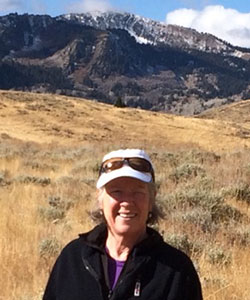By Michele Straube for EDRblog.org.
If my sense of reality about the discourse around environmental and natural resources (ENR) issues was limited to what I read in the news, I’d be worried. Hostile takeovers at a wildlife refuge in Oregon. Heated debate at Utah’s legislature about whether or not to sue the federal government. Trash talk by presidential candidates.
 Luckily, I have the honor of working with stakeholders in collaborative groups who provide a different reality from the polarized discussions in the news. Two of the groups I’m currently facilitating (a grazing collaboration and a watershed partnership) happened to have regular meetings scheduled the week after Cliven Bundy was arrested. Despite dealing with contentious issues, each group has made (and since the events in Oregon, has affirmed) the conscious choice that respectful dialogue and looking for opportunities for mutual gain is their preferred approach to dealing with “wicked” problems, even though it is not an easy path.
Luckily, I have the honor of working with stakeholders in collaborative groups who provide a different reality from the polarized discussions in the news. Two of the groups I’m currently facilitating (a grazing collaboration and a watershed partnership) happened to have regular meetings scheduled the week after Cliven Bundy was arrested. Despite dealing with contentious issues, each group has made (and since the events in Oregon, has affirmed) the conscious choice that respectful dialogue and looking for opportunities for mutual gain is their preferred approach to dealing with “wicked” problems, even though it is not an easy path.
I am not alone in this optimism and commitment to constructive dialogue, and looking into the future, there will be more and more individuals in Utah who have the skills to initiate and participate in collaborative problem-solving conversations. Our program’s efforts to create educational and networking opportunities for individuals interested in collaborative approaches to resolve conflicts have been met with enthusiastic participation and growing financial support.
To be notified when new EDR blog articles are posted, please sign up for our listserv »
Almost a year ago, the EDR Program announced the initiation of a three-part Program on Collaboration, designed to build capacity for dialogue and collaborative problem-solving around ENR issues in Utah. The Program grew out of our published Report Card on EDR In Utah and interviews with state and federal agency leaders and others over the past year. They confirmed the successful use of collaboration by some stakeholders in Utah, and a hunger to learn how to “do collaboration better.”
The first part of the Program on Collaboration was a one-day Forum on Collaboration, co-hosted with The Langdon Group in November 2015 and financially supported with multiple sponsors. As reported earlier by Dan Adams, leaders of almost 30 state and federal agencies gathered in our beautiful new law school building for a day of sharing stories about successes and challenges in collaboration, mutual learning, and networking. One challenge shared by all the Forum participants was the need to collaborate at multiple levels – within their own agency, across agencies and political jurisdictions, with other stakeholders, and with “the public.” One high-placed federal agency leader asserted that “[t]he event [the Forum on Collaboration] will serve as a touchstone for future collaborations.”
As a follow-on to the Forum, we look forward to hosting quarterly Dialogues on Collaboration. Each half-day Dialogue will be focused on a specific challenge or topic, where a broad range of ENR stakeholders can share their experiences, learn from each other, and network to identify opportunities for future collaboration.
And now, the final component of the Program on Collaboration has been created and the application period is open for the Short Course for Effective Natural Resources Collaboration.
In six 1.5-day sessions, starting June 16-17, 2016, mid- and upper-level professionals and others working on ENR issues in Utah will learn the “art and science” of collaborative problem-solving through lectures, case studies, peer-to-peer sharing, discussion, and simulation exercises.
In addition to background reading and time in the classroom, each participant will put the concepts and skills they learn into action in a real-life setting, by designing and implementing an ENR collaboration Capstone Project for an issue they are involved in through their work or community. Mentorship and coaching for these hands-on projects will be provided by Short Course faculty. Short Course graduates will form a cadre of EDR Fellows available to mentor and coach future collaborative projects.
Short Course applications received by April 1, 2016 will be given preference as we create a cohort representing a range of stakeholder interests. Ideally, the inaugural class will include participants from state and federal agencies, municipal and county staff and elected officials, industry, public land users, conservation organizations, and community members. We have some scholarship funding available to help ensure the stakeholder diversity of our first Short Course cohort, generously provided by the Huntsman Foundation and Wagner Charitable Foundation.
 We built it … now we hope you will come. Apply for the Short Course on Effective Natural Resources Collaboration and stay tuned for information about the date and topic of the first Dialogue on Collaboration. Each of us has many opportunities to model effective ways of dealing with contentious ENR discussions and conflict. The Utah Program on Collaboration can help you hone your skills to do just that.
We built it … now we hope you will come. Apply for the Short Course on Effective Natural Resources Collaboration and stay tuned for information about the date and topic of the first Dialogue on Collaboration. Each of us has many opportunities to model effective ways of dealing with contentious ENR discussions and conflict. The Utah Program on Collaboration can help you hone your skills to do just that.
Michele Straube is Director of the Environmental Dispute Resolution (EDR) Program at the Wallace Stegner Center, S.J. Quinney College of Law, University of Utah.
